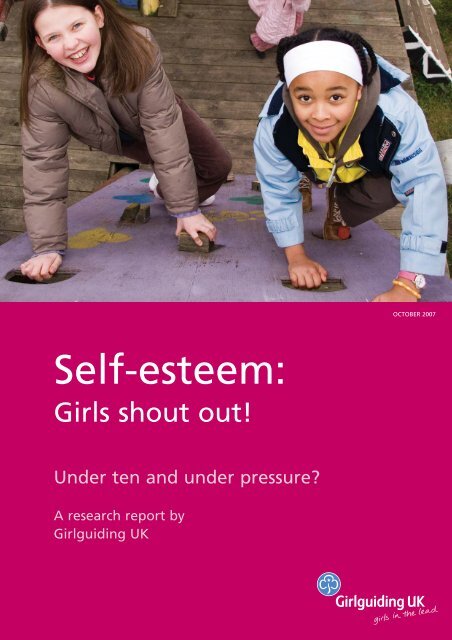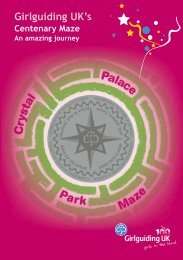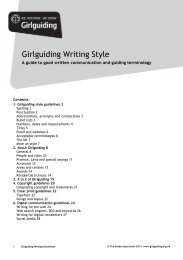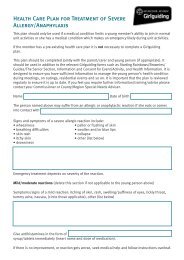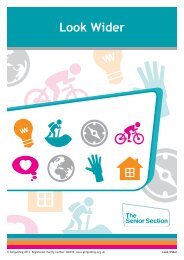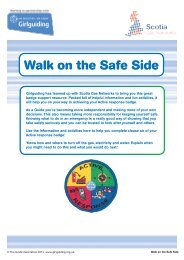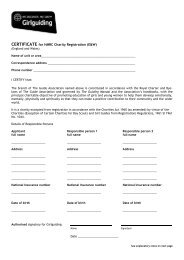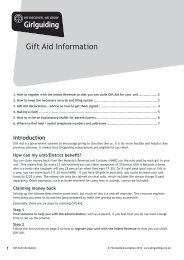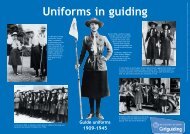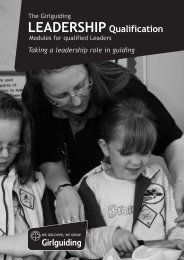Self-esteem: Girls shout out! - Girlguiding UK
Self-esteem: Girls shout out! - Girlguiding UK
Self-esteem: Girls shout out! - Girlguiding UK
- No tags were found...
You also want an ePaper? Increase the reach of your titles
YUMPU automatically turns print PDFs into web optimized ePapers that Google loves.
OCTOBER 2007<strong>Self</strong>-<strong>esteem</strong>:<strong>Girls</strong> <strong>sh<strong>out</strong></strong> <strong>out</strong>!Under ten and under pressure?A research report by<strong>Girlguiding</strong> <strong>UK</strong>
An introductionto <strong>Girlguiding</strong> <strong>UK</strong><strong>Girlguiding</strong> <strong>UK</strong> is the largest organisation in the<strong>UK</strong> that provides a safe, girl-only space for girlsand young women at the most formative time intheir personal and social development.We are privileged to have over half a million youngmembers, aged between five and 25, through<strong>out</strong> the<strong>UK</strong>. One in four eight-year-old girls is a Brownie andone in ten 11-year-old girls is a Guide. More than80,000 trained adult volunteers already give theirtime to our organisation, contributing some tenmillion hours every year.Our aim is to welcome even more members andsupporters, particularly from a wider spectrum ofcultures and socio-economic backgrounds. We havejust appointed our first Diversity Officer, and therecently launched Project SWITCH is reaching <strong>out</strong> tonew communities in England.We remain relevant to today’s girls, introducing intoour programme challenges that extend beyondbadges to encourage girls to develop their potential.Today’s Guides – as well as Rainbows, Brownies andSenior Section members – are involved in anincredibly diverse range of projects, from girl-ledcommunity projects to volunteering in developingcountries.As we approach our centenary in 2010, guiding is stillab<strong>out</strong> helping girls to achieve more than they everthought possible.
<strong>Girlguiding</strong> <strong>UK</strong>’s size and experience give us a uniqueopportunity – and responsibility – to speak <strong>out</strong> ab<strong>out</strong>issues of direct concern to young women. It was inthis spirit that we launched <strong>Girls</strong> <strong>sh<strong>out</strong></strong> <strong>out</strong>! in early2007 – to discover more ab<strong>out</strong> our young members’views on the questions that matter to them most andto ensure that their voices are heard in the publicdebates that affect their lives.For our latest report, <strong>Girlguiding</strong> <strong>UK</strong> has teamed upwith the <strong>UK</strong>’s leading eating disorders charity, beat,to find <strong>out</strong> what girls in guiding really think ab<strong>out</strong>self-<strong>esteem</strong> and body image. The research was carried<strong>out</strong> by pollsters Opinion Leader through a series ofin-depth focus groups with girls between the ages ofseven and ten.ForewordWelcome to <strong>Self</strong>-<strong>esteem</strong>:<strong>Girls</strong> <strong>sh<strong>out</strong></strong> <strong>out</strong>!, thesecond research reportin <strong>Girlguiding</strong> <strong>UK</strong>’s<strong>Girls</strong> <strong>sh<strong>out</strong></strong> <strong>out</strong>! series.<strong>Self</strong>-<strong>esteem</strong>: <strong>Girls</strong> <strong>sh<strong>out</strong></strong> <strong>out</strong>! is an investigation into‘emotional resilience’. It explores how everyone whointeracts with younger girls can help them respondpositively to the many pressures they face as theygrow up, particularly concerning their weight andappearance. We have spoken to girls of this agespecifically because research has shown that many ofthe factors that can contribute to low self-<strong>esteem</strong>and negative body image actually come into playmuch earlier than is generally understood – typicallylong before girls enter their teenage years.<strong>Girlguiding</strong> <strong>UK</strong>’s determination to help girls of allages find the confidence they need to succeed is thereason we continue to help young women developself-<strong>esteem</strong> through new adventures, experiences andfriendships. Our safe girl-only space provides girlswith support beyond the school and homeenvironments. Guiding’s peer education programmetrains hundreds of young women every year toeducate their peers ab<strong>out</strong> sensitive issues, fromeating disorders to mental health and binge drinking.Together, <strong>Girlguiding</strong> <strong>UK</strong> and beat have also beenworking with Dove’s <strong>Self</strong>-Esteem Fund to produceLooking at me, a new self-<strong>esteem</strong> resource for girlsaged between ten and 14.At a time when girls and young women are undermore pressure than ever before, we hope this reportwill shed further light on how all of us can help girlsbuild the self-confidence, self-belief anddetermination they need to broaden their horizons,seize the many opportunities open to them and reachtheir full potential.<strong>Self</strong>-<strong>esteem</strong>: <strong>Girls</strong> <strong>sh<strong>out</strong></strong> <strong>out</strong>! has clearlyhighlighted the concern ab<strong>out</strong> self-<strong>esteem</strong> andbody image that today’s girls feel. That they alsosay how important positive comments from theirfriends and trusted adults are, gives us all anopportunity to help build their self-<strong>esteem</strong>.We know that low self-<strong>esteem</strong> and a negativebody image can be high risk factors for an eatingdisorder developing. Eating disorders are nowaffecting girls as young as eight. beatambassadors, all young people with personalexperience of an eating disorder, were involved inthis action research, contributing their perspectiveand commenting on the findings.By building self-<strong>esteem</strong> and challenging negativestereotypes, we know that we can help girls beatan eating disorder.Susan RingwoodChief Executive OfficerbeatLiz BurnleyChief GuideDenise KingChief Executive
Contents5 MethodologyFocus groups were held in a range oflocations around England.6–7 Executive summary<strong>Girls</strong> reveal their views on appearanceand the factors that help boost their –self-<strong>esteem</strong>.8–9 Planet Happyand Planet SadWhat makes the world a great place forgirls to live in?10–11 Looking at you<strong>Girls</strong> explored whether appearance islinked with popularity and success.12–13 Looking at meThe groups discussed whether they thinkor worry ab<strong>out</strong> their own appearance.14–15 The strength to succeedPositive messages from family andpeers help girls to feel happy andself-confident.16–17 Call to actionYoung experts respond to the poll’sfindings.18 Action in guidingAn important new resource on bodyimage and self-<strong>esteem</strong> is availablefor Guides.
MethodologyFocus groups explored girls’thoughts on self-<strong>esteem</strong> andbody image.What makes me happy? Having a lot of‘ my friends here... and talking.’In order to explore fully the complex and sensitiveissues around self-<strong>esteem</strong> and body image,qualitative data was collected by conducting smallfocus groups under the guidance of leading pollstersOpinion Leader and eating disorders charity beat. Allgirls who took part were members of <strong>Girlguiding</strong> <strong>UK</strong>between the ages of seven and ten – in other words,of Brownie age.Eight group discussions were held in three differentareas of the country, in order to ensure that wecollected the views of girls from a diverse range ofareas. The focus groups were held in Northampton,London and Disley (near Stockport). Fieldwork tookplace between 7 and 24 July 2007.The group sessions lasted between 60 and 90 minutesand were facilitated by researchers from OpinionLeader. Each session involved taking the girls througha number of creative and projective exercises toexplore their experiences and views relating to self<strong>esteem</strong>and body image. beat advised on thesuitability of all exercises and was available toprovide all participants with support during and afterthe sessions.It doesn’t reallymatter what’s on the<strong>out</strong>side, it matters ab<strong>out</strong>what’s on the inside.‘’5
Executivesummary<strong>Girls</strong> believe thatappearance is linked topopularity and happiness –but friends, peers andfamilies can help boosttheir confidence.<strong>Self</strong>-<strong>esteem</strong>: <strong>Girls</strong> <strong>sh<strong>out</strong></strong> <strong>out</strong>! shows girls’ happiness,well-being and confidence to be intrinsically linkedwith having strong and supportive friendship groups.Above all, the research revealed the huge value thatgirls between the ages of seven and ten place onfriends. They see a strong connection betweenhappiness and popularity: having friends they canplay with and talk to, who will stick up for them andmake them feel included.<strong>Girls</strong> in the London focus groups took the linkfurther, making a close association between looksand self-<strong>esteem</strong>, and demonstrating a developedperception of their own body image. They talkedspontaneously ab<strong>out</strong> appearance, with someexpressing anxiety ab<strong>out</strong> their weight and awarenessof how their looks compared to their friends’.Sensitivity to comment and criticism emerged as aparticular issue.In contrast, girls’ greatest fear is bullying: beingsingled <strong>out</strong>, feeling isolated or excluded and falling<strong>out</strong> with friends.Even at this age, many are keenly aware of the rolesthat weight and appearance play at both ends of thespectrum. <strong>Girls</strong> who are slim and pretty are seen asmore likely to be happy, popular, clever and friendly.Meanwhile, girls who are overweight or lessattractive are viewed as more likely to be unhappy,lonely, picked on for their appearance, or victims ofbullying.Feedback from peers, parents and other adults is thestrongest influence on how girls cope with externalpressures ab<strong>out</strong> their appearance. <strong>Girls</strong> were quick torecall negative remarks from siblings, friends andadults which had caused them to judge or questionhow they look, with some taking light-hearted andthrow-away comments very much to heart.Yet they also described how negative thoughts andperceptions can be successfully countered byconstructive messages from friends and family.6
‘What makes me feel good is my friends because theydon’t judge. We're always there for each other.’The most effective are direct reassurances andreminders that looks are less important than ‘what ison the inside’. Family members and friends who cancheer them up and boost their self-<strong>esteem</strong> are seenas central to helping girls to grow in confidence andrecover from setbacks. Many girls are also aware oftheir own responsibility to help peers feel positiveab<strong>out</strong> themselves if they don’t conform to ‘ideal’body types.The critical importance of adults reinforcing positivemessages ab<strong>out</strong> body image also emerged as the keyrecommendation from the panel of young expertswho examined the report’s findings. Representativesfrom <strong>Girlguiding</strong> <strong>UK</strong>’s peer education programmeand beat’s Young Ambassadors Panel emphasised theimpact that even casual observations from grown-ups– for example ab<strong>out</strong> their own weight, or theappearances of friends, family or celebrities – canhave on girls’ self-image. They called for adults totake seriously any doubts girls express ab<strong>out</strong> howthey look, and to respond constructively andencouragingly. They also called for an openenvironment at home and school where concerns canbe discussed, but cautioned against putting too muchemphasis on food or weight.Overall, <strong>Self</strong>-<strong>esteem</strong>: <strong>Girls</strong> <strong>sh<strong>out</strong></strong> <strong>out</strong>! underlines theprofound effect positive peer relationships have ongirls’ self-<strong>esteem</strong>. At this age, the media and celebrityrole models have only a muted impact in comparison.The research also reinforces how important it is thaty<strong>out</strong>h organisations, schools and families foster a safeenvironment where friendships can grow and girlscan develop the empathy and understanding theyneed to support one another. It emphasises theresponsibility we all have to communicateconstructive messages ab<strong>out</strong> body image, thushelping girls develop the confidence and resilienceto maintain their self-belief into their teenage yearsand beyond.7
Planet Happyand Planet SadFriends, kindness, healthand money turn the worldinto Planet Happy.‘And people are drinking their water andthey’re getting fit. And they’re eating lotsof healthy fruit and vegetables or thatkind of stuff.’Girl from London group describing people on Planet HappyAt the start of the discussion, the girls were split intotwo groups. Each group was given a picture of aglobe; one group was told that this was Planet Happywhile the other group had Planet Sad. Both groupswere asked to illustrate what the people on theirplanets might look like, what they might do, whatthey might say and how they might be feeling.Planet HappyAcross all groups, the girls’ strongest association wasbetween happiness and having strong and supportivefriendship groups. Planet Happy was filled withpeople with good friends, who had people to playwith and talk to, who made each other laugh andwho were popular.Planet Happy dwellers did not have to worry ab<strong>out</strong>bullies. Instead, they were kind and friendly toothers. They included people in their games, sharedtoys, approached people who might be left <strong>out</strong> andlooked after each other. <strong>Girls</strong> made a link betweendoing something nice for someone else – like caringfor a sibling who was unwell – and feeling happythemselves.Some girls talked ab<strong>out</strong> money and drew inhabitantsliving in palaces and regularly hitting the shops.Several suggested that residents would have thefreedom to do as they wanted.<strong>Girls</strong> in the London group also made strongconnections between happiness, appearance andlifestyle. They spontaneously described Planet Happyresidents as healthy, eating well, drinking plenty ofwater, being physically active and looking slim.8
‘’Girl from London group describing people on Planet SadI’m so fat. I need to get fit but I want towatch telly.Planet SadMeanwhile on Planet Sad, people were often lonely,had no one to play with, were rejected by theirfriends and had fallen <strong>out</strong> with people they caredab<strong>out</strong>. Some felt angry or anxious after being toldoff by parents or teachers.Not having a loving family was a pronounced featureof Planet Sad. <strong>Girls</strong> talked ab<strong>out</strong> arguments betweenparents and experiencing difficult family situations.Planet Sad was also less affluent. People did not havemoney for the things they wanted and streets andhouses were run down.bullying, often because of weight and appearance.<strong>Girls</strong> in this group explained that children don’t playwith others who are fat or obese. However, reasonswhy bullies singled people <strong>out</strong> included manydifferent aspects of physical difference, from skin,hair and face to accents, clothes and skin colour.‘If people are fatpeople bully them.’Girl from London group describingpeople on Planet SadThe London group described ‘fat’ and ‘lazy’ residentsof Planet Sad lounging in front of the TV and failingto get fit. Many Planet Sad residents were victims of9
Looking at you<strong>Girls</strong> linked being prettywith being popular andsuccessful.AleciaKaty‘If they’re really, reallybeautiful they get very,very popular and if you’revery, very ugly then youget unpopular.’Almost all the girls made a connection betweenbeing happy and being physically attractive in thissession, which explored how they form opinionsab<strong>out</strong> each other.Alecia•‘She might have lots of friends becauseshe’s fashionable.’•‘Would be happy because she looks likeshe’s got make-up on.’Katy•‘She looks very big and at school theyare going to call her names.’•‘I think she looks lonely.’who were slightly overweight would be unhappy,lonely and likely to be picked on or bullied for theirweight. Prettiness was valued most because it wasseen to bring friends.10Specifically, ‘Looking at you’ considered how awarethe girls are of each other’s bodies and appearances,and examined the key influences on the judgementsthey make.<strong>Girls</strong> were shown pictures of six different girls andasked whether they thought they would be happyand popular with their peers. Almost everyoneparticipating felt the girls who were slim and prettywould be happy, popular and friendly, while the girls<strong>Girls</strong> also assumed that those who were slim andpretty would be good at other skills like reading,writing or sport. Fitness and health were also linkedto popularity. Some girls connected happiness withwearing fashionable clothes and being wealthy.There was evidence that the girls had picked up onmessages from parents and schools that how peoplelook is not as important as how they behave. A fewgirls seemed reluctant to make any comments ab<strong>out</strong>
LaurenJasmineDanielleNadiraLauren•‘She’s chubby, so she would get bullied.’Danielle•‘I think Danielle’s very happy – shelooks slim.’•‘She’s a very sporty person and she’s wonlots of achievements so she’s happy.’Jasmine•‘She’s happy because she’s slim andshe’s fit.’•‘She would be popular becauseshe’s skinny.’Nadira•‘She looks a bit shy.’appearance, while others wanted to be certain thattheir observations would not be reported back to thegirls in the photos in case they were upset.However, many girls reported real-life experiences –when bullies target children who look different andpretty girls have the most friends – whichcontradicted these positive messages and reinforcedthe link between happiness and appearance.‘They’re pretty and because of that they might be able torun really fast and like they’re good at like reading andwriting and they’re good at all kinds of things…’11
Lookingat meWhen it came to thinkingab<strong>out</strong> their own appearance,girls revealed very differentlevels of self-awareness.Am I fat? Because my brother thinks I’m fat and healways sings to me, “fatty fatty boom boom!”‘’The ‘Looking at me’ session revealed that some girlsnever thought ab<strong>out</strong> how they looked. Others,however, talked ab<strong>out</strong> feeling overweight; anxiousab<strong>out</strong> wearing certain types of clothes; in tune withhow they measured up against friends; sensitive tocomments by family and peers; and self-consciousab<strong>out</strong> their bodies.The relatively small number of groups involved makesit difficult to draw firm conclusions ab<strong>out</strong> the reasonsfor these differences. However, it does appear thatthose who have friends or classmates who have beensingled <strong>out</strong> because of their size or appearance, orhave suffered bullying themselves ab<strong>out</strong> theirweight, tend to have a more developed sense of theirown body image.Parents or families who comment either negativelyor positively ab<strong>out</strong> appearances also significantlyincrease girls’ awareness of how they look. Teasingfrom siblings was a raw topic for several, as wasawareness of how their looks compare to friends’.<strong>Girls</strong> in London were also significantly more selfawarethan girls from other groups.Many girls also described feeling more concernedab<strong>out</strong> their own appearance on special occasions likeparties, weddings, holidays, or going <strong>out</strong> for dinner,particularly if they felt their parents wanted them tolook their best. However, their principal focus was onwearing clothes that made them feel confident.A small number talked ab<strong>out</strong> feeling self-consciouson occasions when they have to expose more of theirbodies – particularly when they go swimming.One girl admitted to feeling uncomfortable whenswimming with a friend who was developedphysically. A second girl advised larger children:12
‘I like lots of trendy stuff likereally nice T-shirts, skirts andstuff that makes me feel good.’‘Do not wear swimming costumes because you showit.’ A third confessed to feeling self-conscious in croptops that showed her ‘belly’.The girls who mentioned being generally aware ofhow they looked in these situations were also morelikely to voice concerns ab<strong>out</strong> being ‘fat’ or ‘chubby’.A small number also reported going to the gym andknew ab<strong>out</strong> anorexia being a problem for girls whowere too skinny. There was some awareness ofdieting in the London group, with the televisionprogramme ‘You are what you eat’ emerging as aninfluence.‘I go to the gym…nearly every day…I am in my houseand we have gotquite a low settee soI put my feet underit and do sit-ups.’A minority claimed that celebrities such as Kate Mossand Victoria Beckham have an influence on how theygauge their own bodies. However, some also reportedoverhearing adults debating celebrities’ weights andconcluding that Victoria Beckham is ‘too skinny’.13
The strengthto succeedFamily and friends holdthe key to improving girls’self-<strong>esteem</strong>.You could say to them: “No matter what anybody says,it doesn’t matter how you look on the <strong>out</strong>side, but ifyou’re a good person on the inside, then it doesn’treally matter how you look on the <strong>out</strong>side.‘’By far and away the greatest influence on girls’ self<strong>esteem</strong>– and their ability to ride the waves of selfdoubtor negative experience – is positive feedbackfrom family and peers. Constructive messages andactions from these groups emerged clearly as thegreatest influence over how girls respond to externalpressures ab<strong>out</strong> their appearance, and were shown togo a long way towards mitigating damagingemotions and thoughts.<strong>Girls</strong> described mothers and female carers asparticularly important in countering specific criticismsand providing reassurance ab<strong>out</strong> more generalanxieties. They were also seen as a source of advice,and as having an important role in reminding girlsthat looks are not as important as who they are andwhat they do. <strong>Girls</strong> appeared much more likely to beresponsive than sceptical ab<strong>out</strong> this kind ofencouragement and support.14These findings were most pronounced in the finalexercise – ‘The strength to succeed’ – which helpedgirls think ab<strong>out</strong> how they can overcome negativefeelings. The discussion explored which externalfactors make the girls feel happier, more confidentand better equipped to seize all the opportunitiesopen to them.To examine the role peer relationships play inbuilding self-<strong>esteem</strong>, the groups were asked howthey might help a friend who seemed worried ab<strong>out</strong>their appearance. Many understood the importanceof reassuring peers by being kind and complimentary.As one girl put it, ‘I would say “you look beautifuleven if other people can’t see it”.’ Others explained
‘If someone was a bully and they told you, you look uglyand fat then you’ll go on the scales... So then maybe theMum went in and said you look really good instead of fat,because that bully is just being silly. You look really pretty.’that they would try and include a girl in their gamesto take her mind off things. Sticking up for eachother in the face of bullies was also of greatimportance.Some girls also talked positively ab<strong>out</strong> schoolinitiatives. Worry boxes to share concerns, friendshipbenches in the playground and red and yellow cardsfor bad behaviour and bullying were all described asinfluential in shaping girls’ understanding of howthey should cope with issues that upset them or theirfriends.Finally, girls stressed the importance of havingsomeone to talk to and share their feelings with.‘It makes people feel worse if they keepeverything inside.’‘Somebody might saythey look really fat andthen you’d worry. Do Ireally look fat? Andthen you’d worry ab<strong>out</strong>what other peoplewould think.’15
Call toactionYoung experts includingrepresentatives from<strong>Girlguiding</strong> <strong>UK</strong>’s peereducation programme andbeat’s Young AmbassadorsPanel came together toexamine the report’sfindings.The group recommends measures that families, y<strong>out</strong>horganisations, schools and the media can take tobuild girls’ self-<strong>esteem</strong>, and calls on all adults to playtheir part in helping girls develop confidence thatthey can take forward into their teenage years.FamiliesThe group emphasised the critical importance offamilies reinforcing positive messages ab<strong>out</strong> bodyimage and reassuring girls ab<strong>out</strong> their ownappearance. They underlined the profound impactthat even casual observations from parents – forexample ab<strong>out</strong> their own weight, or ab<strong>out</strong> theappearances of friends, family or celebrities – canhave on girls’ self-image.They also highlighted the importance of listening tochildren and taking their concerns seriously. Theystressed that issues raised by younger girls are oftenearly signs of problems that can emerge more acutelyas they grow older.They recommended that parents should focus on thefeelings behind difficult or worrying behaviour.Singling <strong>out</strong> actions for criticism or concern – forexample not eating enough or eating too much – canappear confrontational or judgemental and lead tosecrecy or guilt. They also encouraged an openenvironment where problems can be discussed andreassurances given, although they felt there shouldnot be too much emphasis on either food orappearance.SchoolsSchools were highlighted as potential sources ofpositive information and guidance. The groupstressed the importance of sympathetic and wellinformedteachers and school nurses, and called formore training to ensure that schools could providemuch-needed support. There was a strong view thatschools should be more open to inviting in externalexperts who are able to discuss and advise on self<strong>esteem</strong>and body image.There were also concerns ab<strong>out</strong> schools getting thebalance right when it comes to talking ab<strong>out</strong> newhealthy eating initiatives, to prevent children feelingguilty and anxious ab<strong>out</strong> food.16
The group recommended that understanding mediamanipulation of women’s bodies – such asairbrushing – should be taught as part of thecurriculum, ideally funded by advertisers and mediacompanies.Y<strong>out</strong>h organisationsThe group called on y<strong>out</strong>h organisations to seize theopportunity to provide an alternative space, awayfrom school or home, where girls can grow inconfidence, make new friends and have access toanother adult to talk to. They emphasised theirpotential to help girls discover new interests andrediscover familiar activities that can develop self<strong>esteem</strong>.Specifically, they stressed that theseorganisations have a chance to counteract thetendency for positive pursuits like sport to becomenegative experiences in more formal environments,simply because of thoughtlessness: insisting onskimpy or unflattering gym kit, peer team-pickingand public criticism of those who might bestruggling.<strong>Girls</strong> <strong>sh<strong>out</strong></strong> <strong>out</strong>!A call to action on self-<strong>esteem</strong>•Remember that feedback from adults has aprofound effect on girls’ self-<strong>esteem</strong>.•Never make negative comments ab<strong>out</strong> weight orappearance.•Always offer reassurance ab<strong>out</strong> how girls look –and remind them that in the end, it’s not thatimportant.•Listen to children and take their concernsseriously.•Focus on feelings – don’t criticise negative eatinghabits, find <strong>out</strong> what’s behind them.Don’t put too much emphasis on food or weight.Be available to talk.Help girls learn to respect and support each other.Bring more experts into schools.•Ensure all teachers and school nurses havetraining ab<strong>out</strong> self-<strong>esteem</strong> issues like eatingdisorders.MediaPerhaps surprisingly, girls felt there was not muchthat could be done to rein in the media’s promotionof ultra-thin female role models. Instead, they feltthe focus should be on giving girls the confidence torise above media pressure and form their own viewsab<strong>out</strong> self-image.17
Action in guidingIn September 2007 <strong>Girlguiding</strong> <strong>UK</strong> launched animportant new resource, Looking at me, produced inpartnership with beat and the Dove <strong>Self</strong>-EsteemFund. Packed with a range of activities based on bodyimage and related feelings, it aims to help Guidesdevelop their self-<strong>esteem</strong>. The resource is on offer to125,000 Guides aged ten to 14, and offers them theopportunity to examine and make sense of difficultand challenging subjects within a safe, private girlonlyspace.<strong>Girls</strong> and young women in guiding have manyopportunities to realise their potential through awide range of fun, challenging, girl-led activities.Looking at me is part of a programme that helpsnearly half a million girls in the <strong>UK</strong> to find their placein the world and make their voices heard.Thanks<strong>Girlguiding</strong> <strong>UK</strong> would like to thank the followingindividuals and organisations for their contributionsto•this report:All the Brownies, their parents and the volunteerLeaders who took part in the research.•Representatives from <strong>Girlguiding</strong> <strong>UK</strong>’s y<strong>out</strong>hparticipation programme and beat’s youngambassadors for formulating a call for action inresponse to the report’s findings.•beat, for their expertise and advice in developingthis research.•Opinion Leader for conducting the research andanalysing the headline findings.•Champollion Communications Consultancy,for assistance with research and the report’sdevelopment.18
17-19 Buckingham Palace RoadLondon SW1W 0PTTel: 020 7834 6242Email: pressoffice@girlguiding.org.ukWebsite: www.girlguiding.org.uk© The Guide Association 2007<strong>Girlguiding</strong> <strong>UK</strong> is an operating nameof The Guide Association.Registered charity number 306016.Incorporated by Royal Charter.
For today’s girls, concern over theirappearance and body image emergesat an ever-younger age. <strong>Self</strong>-<strong>esteem</strong>:<strong>Girls</strong> <strong>sh<strong>out</strong></strong> <strong>out</strong>! explores girls’ thoughtsand feelings ab<strong>out</strong> looks, relationshipsand self-<strong>esteem</strong> – and reveals the waysin which we can all help boost theirconfidence, ease the pressure and supportgirls in reaching their full potential.


